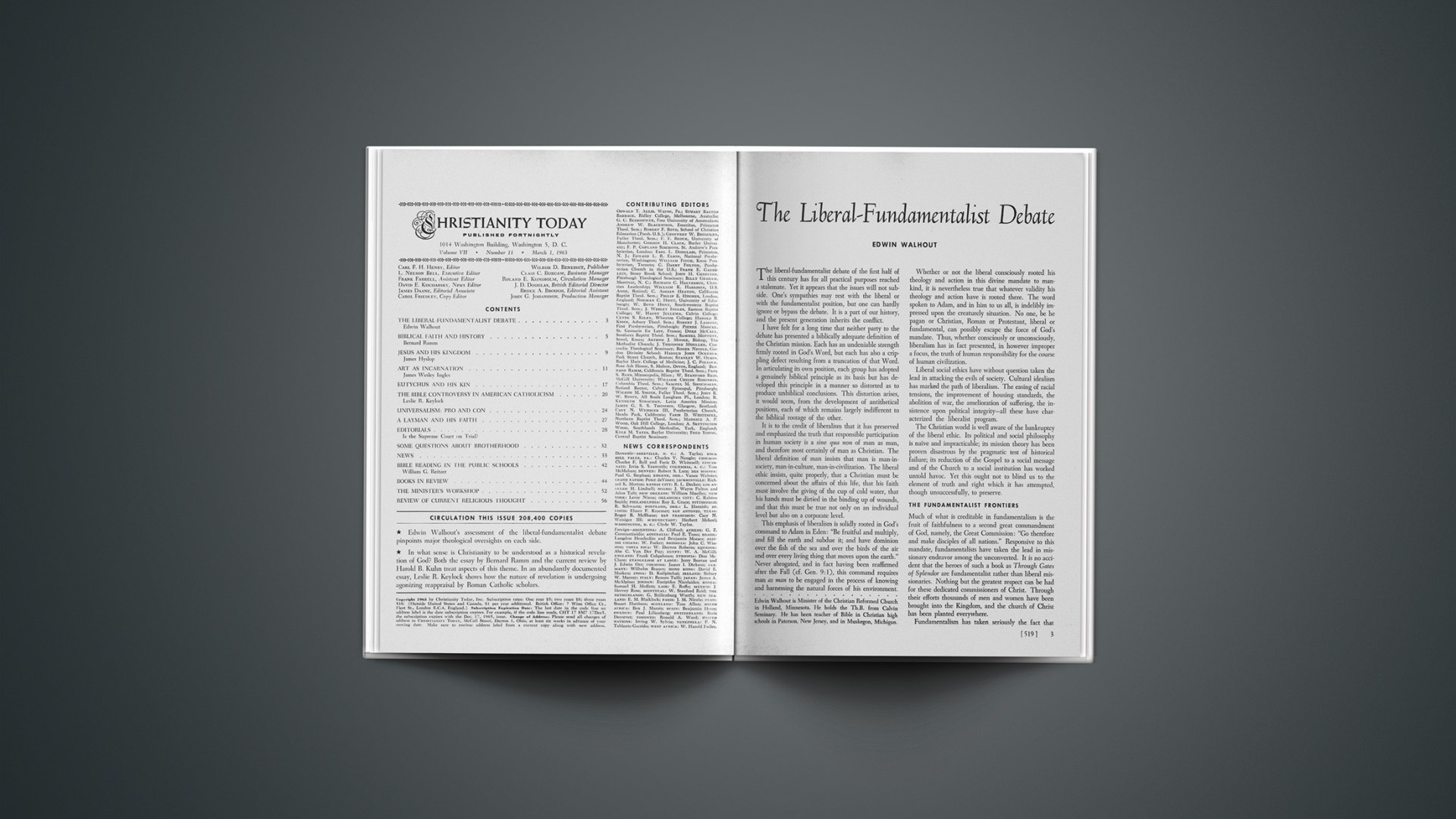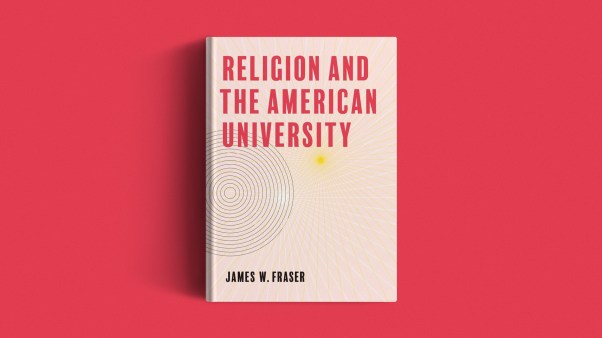The liberal-fundamentalist debate of the first half of this century has for all practical purposes reached a stalemate. Yet it appears that the issues will not subside. One’s sympathies may rest with the liberal or with the fundamentalist position, but one can hardly ignore or bypass the debate. It is a part of our history, and the present generation inherits the conflict.
I have felt for a long time that neither party to the debate has presented a biblically adequate definition of the Christian mission. Each has an undeniable strength firmly rooted in God’s Word, but each has also a crippling defect resulting from a truncation of that Word. In articulating its own position, each group has adopted a genuinely biblical principle as its basis but has developed this principle in a manner so distorted as to produce unbiblical conclusions. This distortion arises, it would seem, from the development of antithetical positions, each of which remains largely indifferent to the biblical rootage of the other.
It is to the credit of liberalism that it has preserved and emphasized the truth that responsible participation in human society is a sine qua non of man as man, and therefore most certainly of man as Christian. The liberal definition of man insists that man is man-in-society, man-in-culture, man-in-civilization. The liberal ethic insists, quite properly, that a Christian must be concerned about the affairs of this life, that his faith must involve the giving of the cup of cold water, that his hands must be dirtied in the binding up of wounds, and that this must be true not only on an individual level but also on a corporate level.
This emphasis of liberalism is solidly rooted in God’s command to Adam in Eden: “Be fruitful and multiply, and fill the earth and subdue it; and have dominion over the fish of the sea and over the birds of the air and over every living thing that moves upon the earth.” Never abrogated, and in fact having been reaffirmed after the Fall (cf. Gen. 9:1), this command requires man as man to be engaged in the process of knowing and harnessing the natural forces of his environment.
Whether or not the liberal consciously rooted his theology and action in this divine mandate to mankind, it is nevertheless true that whatever validity his theology and action have is rooted there. The word spoken to Adam, and in him to us all, is indelibly impressed upon the creaturely situation. No one, be he pagan or Christian, Roman or Protestant, liberal or fundamental, can possibly escape the force of God’s mandate. Thus, whether consciously or unconsciously, liberalism has in fact presented, in however improper a focus, the truth of human responsibility for the course of human civilization.
Liberal social ethics have without question taken the lead in attacking the evils of society. Cultural idealism has marked the path of liberalism. The easing of racial tensions, the improvement of housing standards, the abolition of war, the amelioration of suffering, the insistence upon political integrity—all these have characterized the liberalist program.
The Christian world is well aware of the bankruptcy of the liberal ethic. Its political and social philosophy is naïve and impracticable; its mission theory has been proven disastrous by the pragmatic test of historical failure; its reduction of the Gospel to a social message and of the Church to a social institution has worked untold havoc. Yet this ought not to blind us to the element of truth and right which it has attempted, though unsuccessfully, to preserve.
The Fundamentalist Frontiers
Much of what is creditable in fundamentalism is the fruit of faithfulness to a second great commandment of God, namely, the Great Commission: “Go therefore and make disciples of all nations.” Responsive to this mandate, fundamentalists have taken the lead in missionary endeavor among the unconverted. It is no accident that the heroes of such a book as Through Gates of Splendor are fundamentalist rather than liberal missionaries. Nothing but the greatest respect can be had for these dedicated commissioners of Christ. Through their efforts thousands of men and women have been brought into the Kingdom, and the church of Christ has been planted everywhere.
Fundamentalism has taken seriously the fact that mankind lies in the midst of darkness and sin, a fact not confronted realistically by liberalism. It has also considered of utmost importance that there is but one light which can dispel the darkness of man, but one Saviour who can overcome his sin, namely, Jesus Christ.
Contemporary fundamentalism has, however, paid scant attention to the matters which are central to liberalism. Its lack of a relevant social ethic is acknowledged by both friend and foe, and modern fundamentalism has had an uneasy conscience on this matter for some time. There is little recognition that the routine of participation in human civilization is the very arena of obedience to God.
Because the new life in Christ finds little vital expression in the fundamentalist’s workaday world, the fundamentalist’s activity is channeled almost exclusively into non-cultural programs—midweek prayer meetings, personal witnessing, revivals, and similar activities. Human civilization with its social patterns and political institutions is often looked upon as the undisputed domain of the devil. The victory of Jesus Christ is often interpreted almost exclusively in individualistic terms, and the relevance of the Gospel to society is frequently forgotten. It is not surprising, therefore, that fundamentalism has no theology of culture, no ethic embracing the totality of the human endeavor.
Two Great Commands
In sum, it may be said that liberalism derives its strength from an obedience to the Cultural Mandate, but that its failure arises from a non-recognition of the Fall and of the necessity for the vicarious atonement of Christ. On the other hand, fundamentalism derives its vitality from obedience to the Great Commission, but its failures come from a non-recognition of the process of human civilization as the arena within which Christian faith and obedience are demonstrated.
God has given two great commands to man: the first, to replenish the earth and subdue it; the second, to man as redeemed sinner, to disciple the nations. It is liberalism’s glory that it has not relinquished the first. It is fundamentalism’s glory that it has not forgotten the second. But it is to the discredit of both that they have not taken seriously both of the commands. Neither the Cultural Mandate nor the Great Commission is properly obeyed in isolation from the other. Liberalism is right in insisting that the Gospel has meaning for the process of human civilization in history, but wrong in supposing that a Christian society can be established without personal conversion. Fundamentalism is right in insisting upon a conscious personal commitment of faith in the Lord Jesus Christ and in looking for an ultimate fulfillment beyond this life, but wrong in supposing that the present process of human culture is irrelevant, even antagonistic, to Christian calling.
God is one and unchangeable. His word and will likewise are one and unchangeable. For this reason, God’s will for man as expressed in these two commands must also be understood to be in an essential harmony.
From the beginning God has desired of man that he be obedient in culture. Man was created to subdue the earth—in explicit, open, and voluntary obedience to his Creator. The sin of man, in this respect, is the pursual of his inescapable task of subjugating the powers of nature as his own god, refusing obedience to the only true God. He presumes to be the director of his own civilization.
Jesus commanded his Church to disciple the nations, and his intent should be seen in terms of the Cultural Mandate. Individuals must come to Christ as penitent sinners, receiving from him forgiveness and life. This new life must then come to expression within and by means of the everyday activities which contribute to the welfare of society. The faith of the individual in Christ and his obedience to God must be demonstrated, as Christ’s was, in the terms of his cultural pursuit, whether that be carpentry, farming, teaching, law-making, housekeeping, or whatever.
Beyond the individual faith and obedience, wrought by the Holy Spirit, is the progressive leavening of the entire social fabric in which the Church grows. If the foundation of such a society should happen to be pagan, eventually the Gospel will destroy it, producing new foundations harmonious to the will of God. As the number of individual Christians grows, the cumulative effect will also grow.
Liberal mission theory has attempted to saturate pagan society with the Christian spirit without calling for personal conversion. It has failed disastrously. Fundamentalist mission practice has successfully sought individual converts. But it has lacked the follow-through, the compelling vision of whole nations brought into the kingdom of God under the discipline of God’s word. From two points of view the time is ripe for new visions and for new conquests of the missionary enterprise: negatively, because of the liberal-fundamentalist impasse; positively, because the newly emerging, independent nations present a challenge unparalleled in the history of world civilization.
The resources of the Church are great. The power of the Spirit is greater still. Let all Christians see that the goal of Christian missions is, through individual conversions to Jesus Christ, to bring entire nations, in and with their particular cultural forms, under the domination of the Lord. Through obedience to the Great Commission, the Christian church is challenged to produce a race of men obedient to the Cultural Mandate. Only through obedience to his Saviour can man hope to become obedient to his Creator.
END










